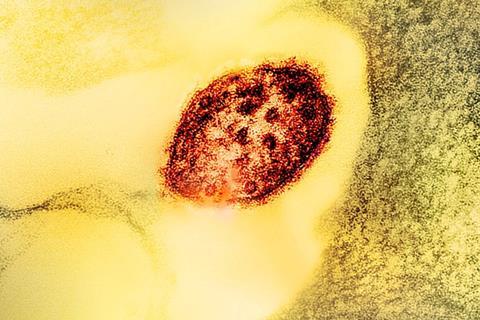The Centers for Disease Control and Prevention (CDC) has issued a health advisory warning about the spread of measles in multiple states across the country. As of March 13, the CDC has confirmed 301 cases of measles as well as the death of a child in Texas.

Reports show that an estimated 94% of measles infections are among individuals who are unvaccinated, or whose vaccination status could not be confirmed. Roughly 80% of cases are in children and adolescents (ages under 5 – 19 years).
READ MORE: Child undernutrition may be contributing to global measles outbreaks
READ MORE: Measles cases surge worldwide, infecting 10.3 million people in 2023
Amid confusion and growing concern, Amira Roess, an epidemiologist and professor of global health, clarifies the benefits of vaccinating children and adolescents against measles. Roess is an expert on emerging zoonotic (animal to human) infectious diseases and their risk factors. She has led the Pew Policy Commission on Industrial Food Animal Production as the science director, served as a CDC epidemic intelligence service officer, and provided guidance for preparedness and response to H5N1 bird flu in 2006. Roess was a leading source during the COVID-19 pandemic and is an in-demand public health consultant.
Wasn’t measles eradicated in the United States?
It’s important to understand the difference between elimination and eradication when it comes to infectious diseases. When we say we have eliminated a virus that means that there is no ongoing transmission of the disease among people in a defined geographic area, such as the U.S. Eradicated means the virus is no longer infecting people anywhere in the world. The only virus that has been eradicated is the smallpox virus which was declared eradicated in 1980.
Smallpox was declared eradicated from the world because we have not seen a single naturally occurring case of smallpox since 1977 in any country. Once it was eradicated from the globe it was possible to discontinue smallpox vaccination because there was no longer a risk of transmission.
Each country works to eliminate the disease. If every country in the world is successful and no disease transmission is reported for at least one year, then that means the disease has been eradicated.
This is not the case for measles. Measles had been declared eliminated in the U.S. in 2000. Since then, there have been localized outbreaks in small tight-knit groups, such as the community in West Texas. This is largely due to low vaccination rates in these communities. Measles is nowhere near eradicated. In 2023, there was about an 80% increase in global cases, which is a likely contributor to the cases popping up in 2024.
Why is the measles vaccine still recommended?
Measles is one of the most infectious viruses out there and can stay suspended in the air for more than two hours, infecting people more easily than most other viruses. Remember that if there is an infectious disease in one country it can be a matter of days or hours before it can infect people in another country because of the amount of international travel and trade that is part of modern life. The measles outbreaks in the U.S. have been linked to international travel. The risk of transmission is still present which is why measles vaccination is important.
The problem is that in some small communities the measles vaccination rate is below the recommended target and these communities are at risk for outbreaks, severe illness and even death. This is one of the reasons that it is important that we work together to get our vaccine rates up.
Why should I vaccinate my child against measles?
Measles is largely preventable. Just like we wear seatbelts to prevent severe injury and death if we were to get into a car accident, we use vaccines to prevent illness and death if we were to get exposed to measles and other infectious diseases. In the U.S. about 93% of school-aged children received the measles vaccine and the overwhelming majority of parents see the benefit of measles vaccination.
According to the CDC, the measles vaccine is proven to be safe and effective. Over 90% of parents choose to vaccinate their children against measles, which is similar to choosing to use seatbelts to protect children.
What is the MMR vaccine and why is it recommended by my child’s pediatrician?
The MMR vaccine contains a combination of measles, mumps, and rubella vaccines, providing immunization from all three. It is one of the oldest and safest vaccines we have. It consistently decreases illness and death and is used around the world and most communities in the U.S.
Do adults need to be vaccinated against measles?
If you received the MMR vaccine as a child, you most likely do not need to receive another shot as an adult. Those who weren’t vaccinated as children should do so as soon as possible. The MMR vaccine is a two-dose vaccine and is generally sufficient but consult with your health care provider to be sure. Also, if you are immunocompromised or work in certain professions you may need a booster.







No comments yet